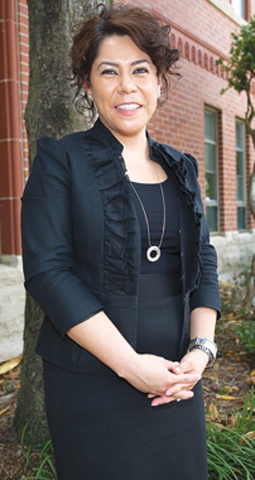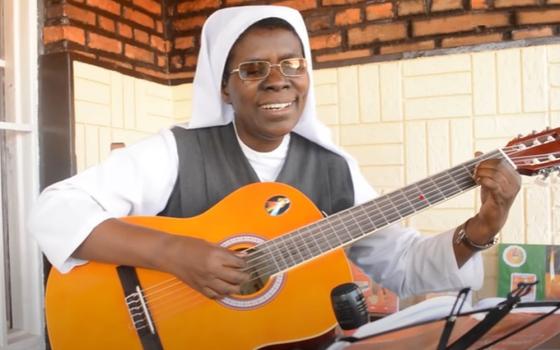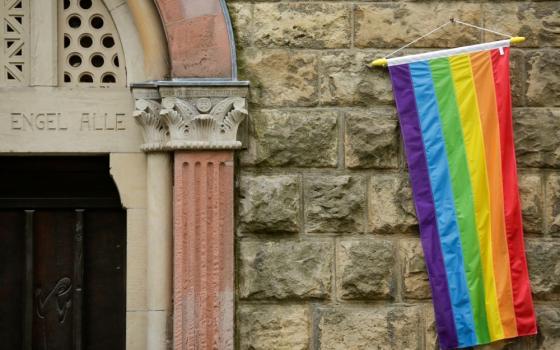
Mireya Reith, director of Arkansas United Community Coalition, is miles and worlds away from Two Rivers, Wis., where she was born 33 years ago.
Sr. Camille: Mireya, where did you spend your childhood?
I spent my early years between Manitowoc and Racine, Wis. When I was in junior high, my family moved to Fayetteville, Ark., which I have considered and continue to consider my hometown.
What was your childhood like?
I grew up in a very loving home with my parents and younger sister. My mother is a first-generation immigrant from Mexico and my father is a native of Wisconsin. My parents met in Mexico City, where my mother worked for my father.
I attended a private Catholic school, Sacred Heart, from first through eighth grade, then did ninth grade and high school in the public school system here in Fayetteville.
I went on to pursue my bachelor's degrees in political science and Spanish at Williams College in Massachusetts. I also completed a master's degree in international affairs at Columbia University in New York, concentrating in political and economic development.
Where my family worked hard to ensure that my sister and I were safe, healthy and happy, my early years in life were very much influenced by my realities of growing up as a Mexican-American in communities that, at that time, did not honor diversity. Observing people's negative reactions to me and my family greatly influenced my personal and professional decisions later in life, forging a mission to demonstrate that diversity is positive and brings value to our society.
Did you have role models, heroes or heroines?
In those early years, a handful of my relatives in Mexico, specifically an aunt and my grandfather, served as my role models. Through their own involvement in politics back in Mexico, they helped me realize the potential good politics can have. They also helped open my eyes to not taking for granted our democracy and our vote. By helping me understand their own fight for a Mexico free of corruption, I was inspired to seek a career in democracy promotion and to help other nations with similar aspirations. Later in life, my activist hero has become Cesar Chavez for his work organizing immigrant workers. My political hero is President Barack Obama -- living proof of the value of diversity to America's political system. My Arkansas role model is Sen. Joyce Elliott, an African-American state senator who consistently puts her values above re-election and was the first political champion for immigrants in our state.
What is your favorite Scripture passage or Gospel story?
Mark 12:31: "The second is this, 'You shall love your neighbor as yourself.' There is no other commandment greater than these."
Has it influenced your life choices?
Both my family and my church have enabled me to see this as my personal and professional mantra. Inspired by the opportunities that the Catholic church gave me to serve my parish and community, I purposefully selected a career of service. Coupled with my passion for political development and diversity, I was able to carve out a professional niche where inclusion and service merged.
Who most influenced your belief system?
Both my parents came from a long line of Catholics. Growing up in this tradition, as I traveled around the country and the world, I'd always seek out the local Catholic parishes and instantly feel at home, regardless of my grasp of the language.
Please describe your current employment.
I'm the co-founder and executive director of Arkansas United Community Coalition, Arkansas' first immigrant advocacy nonprofit organization. AUCC has been working since 2010 to empower Arkansas immigrants and their communities through organizing, coalition building, leadership development and the promotion of civic engagement. We envision an Arkansas that achieves its full potential by all of Arkansas' people, native-born and immigrant, working together. I've been able to build on some previous campaigns to develop an Arkansas Latino youth civic association and direct Hispanic voter outreach during Arkansas' 2010 elections.
Mireya, your efforts to promote diversity have been recognized on several levels. You are the first Latina and youngest person ever appointed by the governor to the Arkansas State Board of Education. You served our country as a municipal development volunteer with the Peace Corps in El Salvador. Despite your youth, your passion for diversity inspired a 14-year career in the field of international political development, where you worked on five continents with American nonprofit organizations and the United Nations. Your goal was to engage marginalized communities in democratic processes.
In 2012, you were recognized as one of the 50 most influential people in Arkansas. In 2013, your efforts were rewarded with the White House's Cesar Chavez Champions of Change Award.
Please say something about your experience in the Peace Corps.
After college, I was eager to put into practice my education and learning with communities abroad. In the Peace Corps, I was assigned as a municipal development volunteer to a small village of Joateca, home to about 800 people. This community had endured the horrors of El Salvador's civil war and was seeking both peace and development. I couldn't have asked for a more welcoming community. The people responded with open arms and with a profound thirst for growing their own leadership and empowering community committees to seek positive change. I had seen poverty before, but I had never lived in it myself. It was this experience that opened my eyes to what it would take to help change the circumstances of people for whom this is a reality. I was humbled by the experience in that I came to fully appreciate that wisdom and knowledge don't come from education alone and that a person's socioeconomic circumstances don't define one's skills and talents. All people, regardless of background, have something to contribute.
What drew you to invest so much of your time and talent in these causes?
I returned to Arkansas in 2010 because of the sudden death of my father from cancer. My family had given me strength to pursue my career and life outside of Arkansas, and I knew I needed to return so we could grieve together. In those early months back, I started volunteering in the community and supporting some political campaigns with the hope of doing something positive during that difficult period. As a Mexican-American, I was drawn to the newly emerged immigrant population in Arkansas. At the end of that year, I was asked by community leaders to take on a more direct leadership role and start this nonprofit, Arkansas United Community Coalition. Throughout my career, I'd always envisioned myself helping others in achieving their leadership potential. And for the first time, I was now being asked to apply my skills and learning to the need of my own state. I was humbled by their request, accepted it, and now find myself on the most fulfilling career move of my life.
Whom do you count among your supporters?
My family, members of our immigrant community, nonimmigrants who care about inclusion and social justice, the faith community that believes in Gospel without borders, the business community that believes in a diverse workforce, political leaders who value their diverse electorate.
Where has your work brought you?
My work has brought me to five continents and, more importantly, to work with all types of social justice advocates and some of the most impoverished in the world. It's also led me to work with our political and economic elite who use their decision-making powers to improve the circumstances of this world. At times, I find myself practicing my faith more actively in the community than in the church, but the church remains the foundation in all I do.
What do you hope to accomplish?
Professionally, I hope to empower more immigrant leaders in my state at all levels of society and to achieve a more just system through policies that emphasize inclusion and integration.
Can you share some experience that sustains your interest in justice for immigrants?
My work is more than a job; it's a mission. And the people with whom I work are not just colleagues, but friends and family. Real lives are at stake, and my sincere hope is to see each one of those lives achieve their potential.
What is your image of God?
A loving father.
Has it changed?
No.
Can you say why?
I can say that with age and experience, I have learned that there is bad and evil in this world, as there is good and love. God's existence and love for us will not always shield us from the bad. But God's loyalty, faith and love can continue to give us strength and guidance, if we let him.
What about your faith is most meaningful to you?
It is a faith I share with my family.
Do you see it in action?
Yes. My work gives me the privilege of observing, and many times encouraging, selfless acts.
Your devotion to others and your deep faith make me wonder if you ever considered joining a religious community.
Yes, when I was attending Catholic school in Wisconsin. Some of my teachers asked me to consider joining them. I have a deep admiration for sisters but feel my calling is elsewhere.
Where do you hope to be 10 years from now?
Having a family and continuing my service, whether locally or abroad. I want to continue making a difference in the lives of others.
How do you bring your faith to the workplace?
I encourage service and selflessness, and that is prevalent in all aspects of our work.
What does Christianity expect of you?
To live a life of service to one another and to God.
How do you pray?
At Mass and during quiet moments, such as in the car. I have conversations with God and ask him questions.
What do you want from Catholicism?
Inclusion.
What in contemporary Catholicism distresses you?
I am encouraged by our new pope and his service to the poor; however, I concerned about polemic debate around the work of nuns, who are invaluable to the social justice community in this country, as well as prospects of recruiting ordained persons in the future.
Is there anything you would change?
Spending several years in Latin America, I became familiar with liberation theology. It is my hope that social justice may continue to be a guiding light for the Catholic church, as we observed so directly through that movement.
What causes you sorrow?
Racism and elitism.
What causes you joy?
Inclusion and integration.
What gives you hope?
Our youth and seeing so many youth leaders step up at a young age to receive the torch for social justice.
What do you want from our faith for the world's children?
That they know that they are loved and that the church can be a home for them the way it has been for me, despite all other changes and experiences they will likely have in their lifetime.
[Mercy Sr. Camille D'Arienzo, broadcaster and author, narrates Stories of Forgiveness, a book about people whose experiences have caused them to consider the possibilities of extending or accepting forgiveness. The audiobook, renamed Forgiveness: Stories of Redemption, is available from Now You Know Media.]
Editor's note: We can send you an email alert every time Sr. Camille's column, "Conversations with Sr. Camille," is posted. Go to this page and follow directions: Email alert sign-up.




